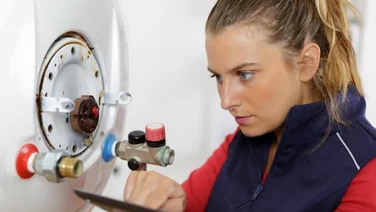We receive a small fee from trusted installers when you request a quote through our site. This helps us keep our content independent, well-researched and up to date – Learn more
- What’s on this page?
- What is a hydrogen boiler?
- Are gas boilers going to be banned?
- What is the UK Hydrogen Strategy?
- How much does a hydrogen boiler cost?
- How does a hydrogen boiler work?
- How is hydrogen made?
- Advantages and disadvantages of hydrogen boilers
- How common are hydrogen boilers in the UK?
- What are the alternatives?
- Summary
In this article we’re looking at hydrogen boilers. For information on ordinary boiler prices, our guide on how much a new boiler might cost has you covered.
As it stands, hydrogen isn’t that popular in the UK – but it’s set to become one of the most common home-heating fuels in the next decade.
Britain currently produces around 27 terawatt-hours (TWh) of hydrogen per year, mostly from fossil fuels. This is 10 times less than the amount needed to meet the government’s net-zero emissions goal by 2050.
But this is all predicted to change, thanks to the UK Hydrogen Strategy – a government plan that will gradually introduce hydrogen into households in a few years’ time.
Soon, hydrogen boilers could become commonplace in British homes. Want to get ahead of the curve and learn more about these eco-friendly appliances? Read on to find out everything you need to know.
Hydrogen-ready boiler prototype from Worcester Bosch
What’s on this page?
What is a hydrogen boiler?
A hydrogen boiler’s purpose is pretty self-explanatory – it burns hydrogen (as opposed to natural gas) to heat a property.
Similar to gas boilers, these appliances work by burning hydrogen via combustion. This creates hot flue gases that can be used to heat water, and can also be stored for later use, ready to be pumped around your radiators.
But why use hydrogen instead of gas?
Well, first and foremost, it’s better for the planet, since hydrogen releases fewer emissions compared to gas and oil. It should also cost homeowners less to heat their properties, because they’ll be able to avoid rising gas prices.
Swapping to a hydrogen boiler can be pretty easy for homeowners to do – some could even avoid having to introduce a whole new heating system. Although some parts of the boiler might be slightly different to a traditional boiler, (namely, the flame detector and the burner), overall, it works in the same way as a gas boiler.
What is a hydrogen-ready boiler?
A hydrogen-ready boiler is able to burn both natural gas and hydrogen, which will make the transition to hydrogen even easier. This means that when the UK’s gas network is ready to switch from gas to hydrogen, you won’t need to replace your gas boiler.
When hydrogen can eventually be introduced into the gas network, it’s likely that it will be phased in with a blend of hydrogen and gas, rather than immediately switching from one to another.
The HyDeploy programme at Keele University has suggested that if a 20% hydrogen and 80% natural gas blend is introduced, no alterations would need to be made to the majority of UK boilers.
Since nearly all gas appliances in use today – including our boilers – are able to run on a mixture of hydrogen and natural gas, we can at least expect to see more use of hydrogen around in the next few years.
Are gas boilers going to be banned?
No, the government has cancelled its planned ban on gas boilers. It now only has a planned phase out of 80% of gas boilers by 2035, with no obligation for UK households to comply.
The gas boiler ban strategy was split up into two main phases, which we’ve outlined below.
Phase one: 2025
Gas boilers would have been banned from all new builds from 2025 onwards.
When it comes to other measures for making all new builds low-carbon by 2025, the Heat and Buildings Strategy simply states that the government will “consult on ending new connections to the gas grid”.
Phase two: 2035
The Heat and Buildings Strategy also stated it was aiming to phase out the installation of all natural gas boilers beyond 2035.
This meant that if your boiler broke after 2035, you would have needed to install a low-carbon alternative, rather than a new gas or oil boiler.
What is the UK Hydrogen Strategy?
The government’s UK Hydrogen Strategy aims to make hydrogen more available and less expensive for businesses and homeowners around the country.
As it stands, low-carbon hydrogen is pretty expensive compared to fossil fuel alternatives, but the government’s strategy states that it will significantly cut the costs by introducing a “similar premise to the offshore wind contracts for difference (CfDs)”.
This means contracts with hydrogen producers will include a payment, which will bridge the gap between the high costs of producing low-carbon hydrogen and an affordable purchase price for industries.
The strategy also states that this business model will be finalised in 2022, and the first contracts will be allocated from the start of 2023.
Hydrogen boilers won’t be ready for the public until around 2025.
But this change to hydrogen boilers won’t happen overnight. It’ll happen over the course of a few years, and will be delivered in three main stages:
- Phase one – New boilers will be built to be ‘hydrogen-ready’, which means they’ll be able to work with both natural gas and hydrogen. We can expect these boilers to be rolled out between 2023-2025
- Phase two – A 20% hydrogen and 80% natural gas blend will be introduced into the national gas supply to reduce emissions. British Gas has said that this isn’t expected to begin until 2028 at the very earliest
- Phase three – The gas supply will switch to 100% hydrogen, which will mean every new boiler sold in the UK will basically be a hydrogen boiler. This stage probably won’t happen until the mid-2040s

How much does a hydrogen boiler cost?
Hydrogen boilers are currently in the prototype stage, which means it’s unclear how much they’ll cost once they’re rolled out to the wider public. However, various boiler manufacturers – including Baxi, Vaillant, and Worcester Bosch – have claimed that they will cost the same amount as a gas boiler.
This means that hydrogen boilers could cost anywhere between £2,550 and £3,150, including installation – but the overall price will depend on the type of boiler you go for.
Want to learn more? Head to our Hydrogen Boiler Costs page to find out everything you need to know.
Which companies are going to make hydrogen boilers?
There currently aren’t any companies selling hydrogen boilers, but some are in the process of creating hydrogen-ready prototypes.
Worcester Bosch unveiled its hydrogen boiler in early 2020, after running tests on it for over three years. The company has stated that they could potentially roll out the boiler from 2025 onwards – but this will only be achievable with government support. Bosch has even trialled the UK’s first 100% Hydrogen Home.
Viessmann has also been working on a hydrogen-ready prototype. The company has stated that the first practical deployment will take place in Germany as part of the SmartQuart project. The rollout might even happen as early as 2023.
Although this method is the most eco-friendly, it’s pretty expensive, which is why green hydrogen currently only makes up a small percentage of overall hydrogen production.
Where are hydrogen boilers being trialled?
There are a handful of hydrogen boiler trials happening around the UK.
Some trials focus specifically on introducing a blend of hydrogen and gas into UK homes, which are located in:
- Keele University, Staffordshire – This trial tested roughly 150 boilers using a 20%/80% hydrogen/gas blend between October 2019 and March 2021, and was completed successfully with no issues along the way
- Winlaton, Gateshead – This 10-month long study supplied 668 houses, a school, several small businesses, and a church with a 20%/80% hydrogen/gas blend. The trial successfully demonstrated that hydrogen can be used safely in the public gas network
There are also a number of ongoing trials that are focusing on rolling out 100% hydrogen boilers, including:
- Hy4Heat, Northumberland – This trial has 100% hydrogen boilers running in specially built demonstration houses. So far, the site has completed over 200 tests, which look into how safe it is to run homes on 100% hydrogen boilers, as well as the logistics of converting homes and gas networks
- Fife, Scotland – SGN is delivering a trial that will involve connecting 300 homes in Fife to a 100% hydrogen gas network. People in the area will have the choice to opt-in for a hydrogen gas supply or remain with their existing natural gas supply
How does a hydrogen boiler work?
Hydrogen boilers work pretty similarly to gas boilers – fuel enters the boiler and is burned to create hot flue gases, which then heat up the water that goes to your hot taps and central heating.
Of course, a lot more goes on behind the scenes:
- Oxygen and hydrogen enter the boiler – Oxygen and hydrogen enter the main boiler unit – the hydrogen comes from the main gas supply, and the oxygen comes from the air. The boiler will also have a valve that can control how much of each gas can enter the boiler, which will impact the size of the flame
- The gases are burned – The hydrogen and oxygen gases will then mix together before being burned in the boiler. Since hydrogen is more flammable than natural gas, the burners in hydrogen boilers are designed to limit the flames if too much gas is flowing through
- The gases enter the heat exchanger – After burning the hydrogen and oxygen, hot flue gases are created and enter the heat exchanger (a component made up of a series of pipes, which allows the hot gas to travel). As the hot gas moves through the exchanger, it heats the water surrounding the pipes, which is then used for the central heating or hot taps
Will your home be suitable for a hydrogen boiler?
In theory, any UK home that is connected to the gas network will be suitable for a hydrogen boiler. At the moment, the gas network doesn’t supply hydrogen, but is expected to within the next few years.
Once this fuel is available, homes with an existing gas boiler will be able to start using a hydrogen blend, and eventually 100% hydrogen to heat their homes.
Of course, there might be complications for some homes, which is why there are ongoing hydrogen trials in the UK – to find out whether some houses aren’t suitable for the swap.
How is hydrogen made?
To produce hydrogen, you need to separate it from the other elements – but when it’s being created as a source of fuel, there’s more to it than that.
There are actually a lot of different ways to produce hydrogen fuel, with each method being labelled on a colour spectrum – which is ironic, considering it’s a colourless fuel.
There are many different ‘colours’ of hydrogen – including green, blue, brown, yellow, turquoise, and even pink – with the most popular types being green and blue. But what’s the difference?
What is green hydrogen?
‘Green’ is the most eco-friendly form of hydrogen because it’s produced with no harmful greenhouse gas emissions.
It’s made by using clean electricity from surplus renewable energy sources, such as solar or wind power, to electrolyse (a chemical reaction) water. Although it sounds complicated, it’s pretty simple – electrolysers use a chemical reaction to split water into its components of hydrogen and oxygen.
Although this method is the most eco-friendly, it’s pretty expensive, which is why green hydrogen currently only makes up a small percentage of overall hydrogen production.
What is blue hydrogen?
Unlike green hydrogen, blue hydrogen doesn’t completely avoid the creation of greenhouse gases, which is why it’s usually described as ‘low-carbon’.
This type of fuel is created mainly from natural gas, using a process called ‘steam reforming’ – this brings together natural gas and heated water in the form of steam, to create hydrogen.
Unfortunately, carbon dioxide is also a by-product of this method. This means that, if blue hydrogen is going to be a form of green fuel, carbon capture and storage (CCS) also needs to be used.
Where is hydrogen made in the UK?
Although hydrogen isn’t popular in the UK yet, energy companies have cottoned on to its potential and have ramped up its production.
Located in Sheffield, ITM Power is a major player in the hydrogen industry thanks to its electrolyser manufacturing facility, which is the largest in the world. Surrey’s AFC Energy also has its own Hydrogen Power (H-Power) system, which is free of pollutants and greenhouse gases.
There are also other renewable energy companies that have only recently expanded their horizons to include hydrogen. Ceres is one key example – it has just earmarked £100 million to develop a solid oxide electrolyser (SOEC) to work on hydrogen electrolysis cells.
Advantages and disadvantages of hydrogen boilers
| Pros | Cons |
|---|---|
| More eco-friendly than gas | Highly flammable |
| High energy efficiency | Most types of hydrogen aren’t totally eco-friendly |
| Can be used with existing infrastructure | Existing appliances may need to be altered |
| Can be easily stored, e.g. it can be compressed, contained in salt caverns, or liquified | Engineers might need to get further qualifications before installing |
How common are hydrogen boilers in the UK?
Hydrogen boilers currently don’t exist, but it’s predicted that they’ll become pretty common in UK households over time.
In fact, the government has estimated that hydrogen could cover 20-35% of the UK’s energy consumption by 2050, providing a clean alternative to oil and gas in energy-intensive industries, like power and transport.
What are the alternatives?
Heat pumps
There are two types of heat pumps – air source heat pumps and ground source heat pumps – and they effectively do the same thing, but in different ways.
- Air source heat pumps – Take heat from the air outside and use it to warm buildings and water systems
- Ground source heat pumps – Need to be connected to underground pipes, which absorb the Earth’s geothermal energy
The government’s Boiler Upgrade Scheme, which will begin in April 2022, makes heat pumps an excellent alternative to hydrogen and gas boilers.
With this scheme, homeowners in England and Wales will be able to get £5,000 off the cost of a new air source heat pump, and £6,000 off the price of a ground source heat pump.
Infrared heating systems
Instead of warming the air like a traditional boiler, infrared heaters warm people and objects directly, which re-radiates the warmth back into the room.
The system works by emitting infrared from the heater, which then travels through the air until it hits an object. The object then absorbs the radiation, causing molecules within it to vibrate and produce heat.
Although infrared heating is fairly new to the domestic and commercial heating scene, you can bag yourself a panel for about £79 – larger ones, however, will be in the £300-£400 range.
Plus, infrared heating running costs are far less than that of conventional boilers.
Biomass boilers
Biomass boilers are very similar to conventional boilers, providing space heating and hot water for an entire home. Instead of using gas or oil to produce the heat, biomass heating systems burn wood pellets, chips, or logs to power central heating and hot water boilers.
Although these materials release carbon dioxide when burned, it’s considerably less than the amount released by fossil fuels.
District heat networks
A district heat network – also called district heating – is essentially an underground system of insulated pipes that takes heat from a central source and delivers it to a number of domestic or non-domestic buildings.
Although district heat networks aren’t too popular at the moment, it’s estimated that 20% of UK heating will be served by district heat networks by 2050.
And, since the annual cost of district heating is roughly 19% lower than the cost of a natural gas boiler, you might want to get on board with district heating before others start to cotton on.
Summary
Hydrogen is set to take the UK by storm. By 2050, we can expect it to supply 20-35% of the UK’s energy generation, which will help us reduce our carbon footprint and heat our homes efficiently.
In the meantime, there are plenty of other eco-friendly forms of heating available for UK homeowners.
Want to learn more about greener alternatives? Check out some of our guides below:








